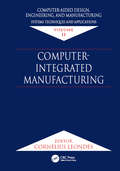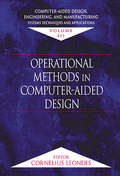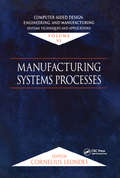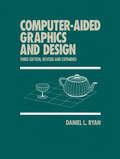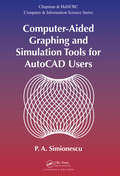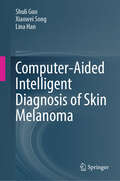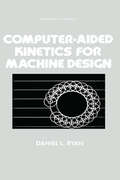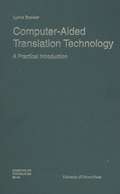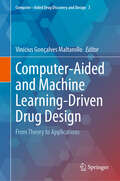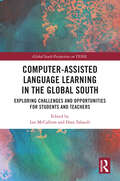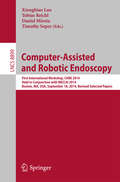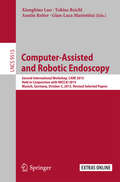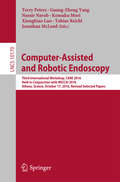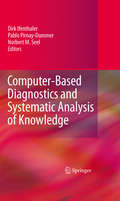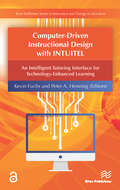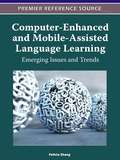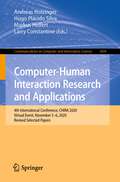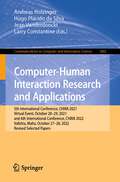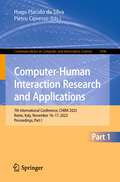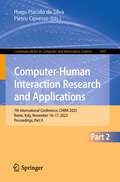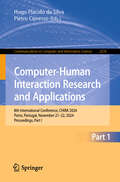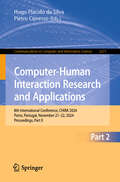- Table View
- List View
Computer-Aided Design, Engineering, and Manufacturing: Systems Techniques and Applications, Volume II, Computer-Integrated Manufacturing
by Cornelius T. LeondesIn the competitive business arena companies must continually strive to create new and better products faster, more efficiently, and more cost effectively than their competitors to gain and keep the competitive advantage. Computer-aided design (CAD), computer-aided engineering (CAE), and computer-aided manufacturing (CAM) are now the industry standa
Computer-Aided Design, Engineering, and Manufacturing: Systems Techniques and Applications, Volume III, Operational Methods in Computer-Aided Design
by Cornelius LeondesIn the competitive business arena companies must continually strive to create new and better products faster, more efficiently, and more cost effectively than their competitors to gain and keep the competitive advantage. Computer-aided design (CAD), computer-aided engineering (CAE), and computer-aided manufacturing (CAM) are now the industry standa
Computer-Aided Design, Engineering, and Manufacturing: Systems Techniques and Applications, Volume IV, Optimization Methods for Manufacturing
by Cornelius LeondesIn the competitive business arena companies must continually strive to create new and better products faster, more efficiently, and more cost effectively than their competitors to gain and keep the competitive advantage. Computer-aided design (CAD), computer-aided engineering (CAE), and computer-aided manufacturing (CAM) are now the industry standa
Computer-Aided Design, Engineering, and Manufacturing: Systems Techniques and Applications, Volume V, The Design of Manufacturing Systems
by Cornelius LeondesIn the competitive business arena companies must continually strive to create new and better products faster, more efficiently, and more cost effectively than their competitors to gain and keep the competitive advantage. Computer-aided design (CAD), computer-aided engineering (CAE), and computer-aided manufacturing (CAM) are now the industry standa
Computer-Aided Design, Engineering, and Manufacturing: Systems Techniques and Applications, Volume VI, Manufacturing Systems Processes
by Cornelius LeondesIn the competitive business arena companies must continually strive to create new and better products faster, more efficiently, and more cost effectively than their competitors to gain and keep the competitive advantage. Computer-aided design (CAD), computer-aided engineering (CAE), and computer-aided manufacturing (CAM) are now the industry standard. These seven volumes give the reader a comprehensive treatment of the techniques and applications of CAD, CAE, and CAM.
Computer-Aided Graphics and Design (Computer Aided Engineering Ser. #4)
by Daniel L. RyanThis text, now in its third edition, presents all common methods of computer/automated graphical construction most helpful to the engineering student, draftsperson or designer, describing, in easy-to-understand terms, a wide range of hardware platforms that will run a single set of software options from the Autodesk Corporation. Rewritten and illustrated with over 330 tables, drawings and photographs, this is a vital reference for all mechanical, electrical and electronics, manufacturing, software, civil and architectural engineers; engineering designers and drafters, and industrial illustrartors and asrtisits. A defintive text on the subject for students familiar with LISP in undergarduate courses.
Computer-Aided Graphing and Simulation Tools for AutoCAD Users
by P. A. SimionescuThis book allows readers to expand the versatility of AutoCAD design and documentation software. It provides ready-to-use procedures and computer programs for solving problems in a variety of application areas, including computer-aided design, data visualization, evolutionary computation, numerical methods, single and multicriteria optimization, li
Computer-Aided Intelligent Diagnosis of Skin Melanoma
by Shuli Guo Lina Han Xiaowei SongThis book is intended primarily for researchers, engineers, and graduate students in the fields of medicine management and software engineering in the field of dermatology. Aiming at the problems of color deviation, structured noise interference, and uneven distribution of feature points in the identification of melanoma, this book researches four aspects of dermoscopic image such as color correction, hair removal, image registration and classification recognition. Some creative methods are presented as follows, 1 Dermoscopic image color correction, 2 Dermoscopic image hair removal, 3 Dermoscopic image registration. In writing style, a combination of diagrams, tables, formula and text is used in order that the book can be understood easily and raise the readers&’ interest, and in content, theoretical analysis and medical application are combined to describe the advanced technologies in every chapter.
Computer-Aided Kinetics for Machine Design (Mechanical Engineering Ser. #7)
by Daniel L. RyanThis book presents a study of computer-aided machine design and explains the fundamental concepts of kinematics and machine element design in lay terms. It is useful for those concerned with developing new programs in computer-aided design, in both industry and education.
Computer-Aided Translation Technology: A Practical Introduction
by Lynne BowkerLynne Bowker introduces the world of technology to the world of translation in this unique book, the first of its kind. Bowker reveals the role of technology in translation and how to use this ever developing tool.
Computer-Aided and Machine Learning-Driven Drug Design: From Theory to Applications (Computer-Aided Drug Discovery and Design #3)
by Vinícius Gonçalves MaltarolloThe computer-aided drug design research field comprises several different knowledge areas, and often, researchers are only familiar or experienced with a small fraction of them. Indeed, pharmaceutical industries and large academic groups rely on a broad range of professionals, including chemists, biologists, pharmacists, and computer scientists. In this sense, it is difficult to be an expert in every single CADD approach. Furthermore, there are well-established methods that are constantly revisited, and novel approaches are introduced, such as machine-learning based scoring functions for molecular docking. This book provides an organized update of the most commonly employed CADD techniques, as well as successful examples of actual applications to develop bioactive compounds/drug candidates. Also includes is a section of case studies that cover certain pharmacological/target classes, focusing on the applications of the previously described methods. This part will especially appeal to professionals who are not as interested in the theoretical aspects of CADD. This is an ideal book for students, researchers, and industry professionals in the fields of pharmacy, chemistry, biology, bioinformatics, computer sciences, and medicine who are seeking a go-to reference on drug design and medicinal chemistry.
Computer-Assisted Language Learning in the Global South: Exploring Challenges and Opportunities for Students and Teachers (Global South Perspectives on TESOL)
by Lee McCallum and Dara TafazoliThis cross-cultural edited volume presents a rich tapestry of experiences, challenges, and innovations, focusing on assessment, course and curriculum design, approaches to pedagogy and teacher professional development in computer-assisted language learning (CALL) in the Global South.Comprising chapters from a broad swathe of international contexts, the book presents varied themes in CALL such as inclusion and social justice, artificial intelligence, barriers to online language teaching, skills-based practices, and professional development. By shedding light on the underrepresented research contexts in the Global South, a number of current innovations in these contexts at theoretical and empirical levels are showcased, resulting in a highly novel and cutting-edge volume that gives voice to perspectives on the implementation of CALL in less-privileged countries.Providing comparative research and innovative ways in which CALL can be harnessed in less-privileged contexts despite lack of resources in some cases, this book will appeal to scholars, researchers, and postgraduate students in the fields of technology in education, language and linguistics, as well as open and distance education and eLearning. CALL and TESOL educators may also benefit from the book.
Computer-Assisted and Robotic Endoscopy: First International Workshop, CARE 2014, Held in Conjunction with MICCAI 2014, Boston, MA, USA, September 18, 2014. Revised Selected Papers (Lecture Notes in Computer Science #8899)
by Xiongbiao Luo Tobias Reichl Daniel Mirota Timothy SoperThis book constitutes the refereed proceedings of the First International Workshop on Computer Assisted and Robotic Endoscopy, CARE 2014, held in conjunction with MICCAI 2014, in Boston, MA, USA, in September 2014. The 12 papers presented focus on recent technical advances associated with computer vision; graphics; robotics and medical imaging; external tracking systems; medical device control systems; information processing techniques; endoscopy; planning and simulation.
Computer-Assisted and Robotic Endoscopy: Second International Workshop, CARE 2015, Held in Conjunction with MICCAI 2015, Munich, Germany, October 5, 2015, Revised Selected Papers (Lecture Notes in Computer Science #9515)
by Xiongbiao Luo Tobias Reichl Austin Reiter Gian-Luca MariottiniThis book constitutes the thoroughly refereedpost-conference proceedings of the Second International Workshop on ComputerAssisted and Robotic Endoscopy, CARE 2015, held in conjunction with MICCAI2015, in Munich, Germany, in October 2015. The 15 revised full papers were carefully selected out of20 initial submissions and focus on recent technical advances associated withcomputer vision; graphics; robotics and medical imaging; external trackingsystems; medical device control systems; information processing techniques;endoscopy; planning and simulation.
Computer-Assisted and Robotic Endoscopy: Third International Workshop, CARE 2016, Held in Conjunction with MICCAI 2016, Athens, Greece, October 17, 2016, Revised Selected Papers (Lecture Notes in Computer Science #10170)
by Xiongbiao Luo Tobias Reichl Kensaku Mori Guang-Zhong Yang Terry Peters Nassir Navab Jonathan McleodThis book constitutes the refereed proceedings of the First International Workshop on Computer Assisted and Robotic Endoscopy, CARE 2014, held in conjunction with MICCAI 2014, in Boston, MA, USA, in September 2014. The 12 papers presented focus on recent technical advances associated with computer vision; graphics; robotics and medical imaging; external tracking systems; medical device control systems; information processing techniques; endoscopy; planning and simulation.
Computer-Based Diagnostics and Systematic Analysis of Knowledge
by Norbert M. Seel Dirk Ifenthaler Pablo Pirnay-DummerWhat is knowledge? How can it be successfully assessed? How can we best use the results? As questions such as these continue to be discussed and the learning sciences continue to deal with expanding amounts of data, the challenge of applying theory to diagnostic methods takes on more complexity. Computer-Based Diagnostics and Systematic Analysis of Knowledge meets this challenge head-on as an international panel of experts reviews current and emerging assessment methodologies in the psychological and educational arenas. Emphasizing utility, effectiveness, and ease of interpretation, contributors critically discuss practical innovations and intriguing possibilities (including mental representations, automated knowledge visualization, modeling, and computer-based feedback) across fields ranging from mathematics education to medicine. These contents themselves model the steps of systematic inquiry, from theoretical construct to real-world application: Historical and theoretical foundations for the investigation of knowledge Current opportunities for understanding knowledge empirically Strategies for the aggregation and classification of knowledge Tools and methods for comparison and empirical testing Data interfaces between knowledge assessment tools Guidance in applying research results to particular fields Researchers and professionals in education psychology, instructional technology, computer science, and linguistics will find Computer-Based Diagnostics and Systematic Analysis of Knowledge a stimulating guide to a complex present and a rapidly evolving future.
Computer-Driven Instructional Design with INTUITEL
by Kevin Fuchs Peter A. HenningINTUITEL is a research project that was co-financed by the European Commission with the aim to advance state-of-the-art e-learning systems via addition of guidance and feedback for learners. Through a combination of pedagogical knowledge, measured learning progress and a broad range of environmental and background data, INTUITEL systems will provide guidance towards an optimal learning pathway. This allows INTUITEL-enabled learning management systems to offer learners automated, personalised learning support so far only provided by human tutors INTUITEL is - in the first place - a design pattern for the creation of adaptive e-learning systems. It focuses on the reusability of existing learning material and especially the annotation with semantic meta data. INTUITEL introduces a novel approach that describes learning material as well as didactic and pedagogical meta knowledge by the use of ontologies. Learning recommendations are inferred from these ontologies during runtime. This way INTUITEL solves a common problem in the field of adaptive systems: it is not restricted to a certain field. Any content from any domain can be annotated. The INTUITEL research team also developed a prototype system. Both the theoretical foundations and how to implement your own INTUITEL system are discussed in this book.
Computer-Enhanced and Mobile-Assisted Language Learning: Emerging Issues and Trends
by Felicia ZhangAs the field of Information and Communication Technologies rapidly expands, the applications to language learning continue to grow. Computer-Enhanced and Mobile-Assisted Language Learning: Emerging Issues and Trends compiles the latest research into computer-enhanced language learning, as well as the integration of mobile devices into new language acquisition. Though new information is constantly coming out as technologies continue to evolve, this important new follow-up publication will be distributed worldwide among academic and professional institutions and will be instrumental in providing researchers, scholars, students, and professionals access to the latest knowledge related to research on computer-enhanced and mobile assisted language learning.
Computer-Forensik Hacks
by Lorenz Kuhlee Victor VölzowComputer-Forensik Hacks ist eine Sammlung von Methoden, Tipps und Tricks - kurz: Hacks - aus allen Bereichen der Computer-Forensik. Die Autoren, die bei der Polizei Forensiker ausbilden, haben praktische Lösungen für echte Problemstellungen aus dem Computer-Forensik-Alltag in kleine, bekömmliche Portionen gepackt, die direkt angewendet werden können. Zu jeder praktischen Lösung gibt es auch das notwendige Hintergrundwissen mit auf den Weg, das benötigt wird, um sowohl das Problem wie auch den Lösungsansatz nachvollziehen zu können. Nicht nur für Forensiker Nicht nur Forensiker müssen heutzutage wissen, wie sie den Zustand eines Computersystems sichern können, damit dies bei späteren Gerichtsverhandlungen juristisch wasserdicht ist. Auch für Systemadministratoren aus der freien Wirtschaft gehört mittlerweile ein computer-forsensisches Grundwissen zum Arbeitsalltag. Und auch Rechtsanwälte benötigen immer wieder Wissen darüber, was bei einer Datensicherung beachtet werden muss. 100 spannende Hacks rund um das Thema Computer-Forensik Computer-Forensik Hacks beginnt mit Hacks zur Vorbereitung und Datensicherung, gefolgt von Tipps und Tricks zu Dateisystemen. Der Hauptteil dreht sich um Datenwiederherstellung und das Analysieren der unterschiedlichsten digitalen Spuren, bevor Kapitel zu den Themen Hacking und Virtualisierung folgen. Alle Hacks arbeiten mit Open-Source- oder freier Software Die Hacks in diesem Buch benutzen grundsätzlich kostenlose Software, also Open-Source- oder Freeware Software. Bei wenigen Lösungen verweisen die Autoren aber auch auf Software, die für die Privatnutzung kostenlos, für gewerbliche oder behördliche Nutzung jedoch kostenpflichtig ist. Die beschriebenen Programme laufen durchgängig auf den Betriebssystemen Microsoft Windows oder Linux.
Computer-Human Interaction Research and Applications: 4th International Conference, CHIRA 2020, Virtual Event, November 5–6, 2020, Revised Selected Papers (Communications in Computer and Information Science #1609)
by Andreas Holzinger Markus Helfert Hugo Plácido Silva Larry ConstantineThis book constitutes selected papers of the Fourth International Conference on Computer-Human Interaction Research and Applications, CHIRA 2020, held virtually, in November 2020.The 8 full papers presented in this book were carefully reviewed and selected from 44 submissions. The papers selected to be included in this book contribute to the understanding of relevant trends of current research on computer-human interaction, including Interaction design, human factors, entertainment, cognition, perception, user-friendly software and systems, pervasive technologies and interactive devices.
Computer-Human Interaction Research and Applications: 5th International Conference, CHIRA 2021, Virtual Event, October 28–29, 2021, and 6th International Conference, CHIRA 2022, Valletta, Malta, October 27–28, 2022, Revised Selected Papers (Communications in Computer and Information Science #1882)
by Jean Vanderdonckt Andreas Holzinger Hugo Plácido da Silva Larry ConstantineThis post-conference book constitutes selected papers of the Fifth International Conference on Computer-Human Interaction Research and Applications, CHIRA 2021, held virtually due to COVID 19, and Sixth International Conference on Computer-Human Interaction Research and Applications, CHIRA 2022, held in Valletta, Malta, in October 2022.The 8 full papers presented in this book were carefully reviewed and selected from 48 submissions for CHIRA 2021 and 37 submissions for CHIRA 2022. The papers selected to be included in this book contribute to the understanding of relevant trends of current research on computer-human interaction, including user-centered interaction design patterns, user experience design, multimedia and multimodal Interaction, interaction design modelling, haptic and tangible devices, accessible and adaptive interaction, user behaviour analysis, user experience evaluation, modelling human factors, mobile computer-human interaction, machine learning, information retrieval, human-centered AI and design and evaluation.
Computer-Human Interaction Research and Applications: 7th International Conference, CHIRA 2023, Rome, Italy, November 16–17, 2023, Proceedings, Part I (Communications in Computer and Information Science #1996)
by Hugo Plácido da Silva Pietro CipressoThese 2 volumes constitute the selected papers of the 7th International Conference, CHIRA 2023, held Rome, Italy, during November 16–17, 2023.The 14 full papers and the 29 short papers presented in these books were carefully reviewed and selected from 69 submissions. The papers selected contribute to the advancement of research and practical applications of human-technology and human-computer interaction. Different aspects of Computer-Human Interaction were covered in four parallel tracks: human factors for interactive systems, research, and applications; interactive devices; interaction design; and adaptive and intelligent systems.
Computer-Human Interaction Research and Applications: 7th International Conference, CHIRA 2023, Rome, Italy, November 16–17, 2023, Proceedings, Part II (Communications in Computer and Information Science #1997)
by Hugo Plácido da Silva Pietro CipressoThese 2 volumes constitute the selected papers of the 7th International Conference, CHIRA 2023, held Rome, Italy, during November 16–17, 2023.The 14 full papers and the 29 short papers presented in these books were carefully reviewed and selected from 69 submissions. The papers selected contribute to the advancement of research and practical applications of human-technology and human-computer interaction. Different aspects of Computer-Human Interaction were covered in four parallel tracks: human factors for interactive systems, research, and applications; interactive devices; interaction design; and adaptive and intelligent systems.
Computer-Human Interaction Research and Applications: 8th International Conference, CHIRA 2024, Porto, Portugal, November 21–22, 2024, Proceedings, Part I (Communications in Computer and Information Science #2370)
by Hugo Plácido da Silva Pietro CipressoThis two-volume set, CCIS 2370 and CCIS 2371, constitutes the proceedings of the 8th International Conference on Computer-Human Interaction Research and Applications, CHIRA 2024, held Porto, Portugal, during November 21–22, 2024. The 16 full papers and 45 short papers presented in these volumes were carefully reviewed and selected from 76 submissions. These papers focus on the research advancements and practical applications within various areas in the field of Computer-Human Interaction, including Human Factors and Information Systems, Interactive Devices, Interaction Design and Adaptive and Intelligent Systems.
Computer-Human Interaction Research and Applications: 8th International Conference, CHIRA 2024, Porto, Portugal, November 21–22, 2024, Proceedings, Part II (Communications in Computer and Information Science #2371)
by Hugo Plácido da Silva Pietro CipressoThis two-volume set, CCIS 2370 and CCIS 2371, constitutes the proceedings of the 8th International Conference on Computer-Human Interaction Research and Applications, CHIRA 2024, held Porto, Portugal, during November 21–22, 2024. The 16 full papers and 45 short papers presented in these volumes were carefully reviewed and selected from 76 submissions. These papers focus on the research advancements and practical applications within various areas in the field of Computer-Human Interaction, including Human Factors and Information Systems, Interactive Devices, Interaction Design and Adaptive and Intelligent Systems.
